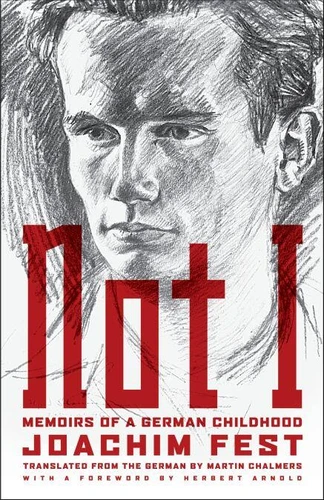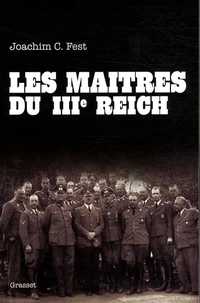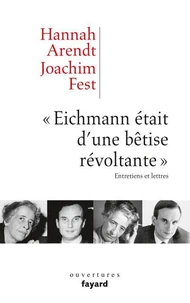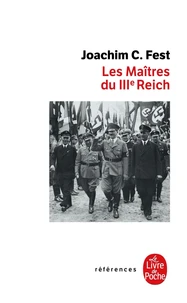Joachim Fest (1926-2006), historien et essayiste allemand, a notamment écrit Les Maîtres du IIIe Reich (1963).
Not I. Memoirs of a German Childhood
Par :Formats :
Disponible dans votre compte client Decitre ou Furet du Nord dès validation de votre commande. Le format ePub protégé est :
- Compatible avec une lecture sur My Vivlio (smartphone, tablette, ordinateur)
- Compatible avec une lecture sur liseuses Vivlio
- Pour les liseuses autres que Vivlio, vous devez utiliser le logiciel Adobe Digital Edition. Non compatible avec la lecture sur les liseuses Kindle, Remarkable et Sony
- Non compatible avec un achat hors France métropolitaine
 , qui est-ce ?
, qui est-ce ?Notre partenaire de plateforme de lecture numérique où vous retrouverez l'ensemble de vos ebooks gratuitement
Pour en savoir plus sur nos ebooks, consultez notre aide en ligne ici
- Nombre de pages336
- FormatePub
- ISBN978-1-59051-611-9
- EAN9781590516119
- Date de parution11/02/2014
- Protection num.Adobe DRM
- Taille5 Mo
- Infos supplémentairesepub
- ÉditeurOther Press
Résumé
A New York Times Book Review Notable Book of the Year, a portrait of an intellectually rigorous German household opposed to the Nazis and how its members suffered for their political stance. Few writers have deepened our understanding of the Third Reich as much as German historian, biographer, journalist, and critic Joachim Fest. His biography of Adolf Hitler has reached millions of readers around the world.
Born in 1926, Fest experienced firsthand the rise of the Nazis, the Second World War, and a catastrophically defeated Germany, thus becoming a vital witness to these difficult years. In this memoir of his childhood and youth, Fest offers a far-reaching view of how he experienced the war and National Socialism. True to the German Bildung tradition, Fest grows up immersed in the works of Goethe, Schiller, Mörike, Rilke, Kleist, Mozart, and Beethoven.
His father, a conservative Catholic teacher, opposes the Nazi regime and as a result loses his job and status. Fest is forced to move to a boarding school in the countryside that he despises, and in his effort to come to terms with his father's strong political convictions, he embarks on a tireless quest for knowledge and moral integrity that will shape the rest of his life and writing career.
Born in 1926, Fest experienced firsthand the rise of the Nazis, the Second World War, and a catastrophically defeated Germany, thus becoming a vital witness to these difficult years. In this memoir of his childhood and youth, Fest offers a far-reaching view of how he experienced the war and National Socialism. True to the German Bildung tradition, Fest grows up immersed in the works of Goethe, Schiller, Mörike, Rilke, Kleist, Mozart, and Beethoven.
His father, a conservative Catholic teacher, opposes the Nazi regime and as a result loses his job and status. Fest is forced to move to a boarding school in the countryside that he despises, and in his effort to come to terms with his father's strong political convictions, he embarks on a tireless quest for knowledge and moral integrity that will shape the rest of his life and writing career.
A New York Times Book Review Notable Book of the Year, a portrait of an intellectually rigorous German household opposed to the Nazis and how its members suffered for their political stance. Few writers have deepened our understanding of the Third Reich as much as German historian, biographer, journalist, and critic Joachim Fest. His biography of Adolf Hitler has reached millions of readers around the world.
Born in 1926, Fest experienced firsthand the rise of the Nazis, the Second World War, and a catastrophically defeated Germany, thus becoming a vital witness to these difficult years. In this memoir of his childhood and youth, Fest offers a far-reaching view of how he experienced the war and National Socialism. True to the German Bildung tradition, Fest grows up immersed in the works of Goethe, Schiller, Mörike, Rilke, Kleist, Mozart, and Beethoven.
His father, a conservative Catholic teacher, opposes the Nazi regime and as a result loses his job and status. Fest is forced to move to a boarding school in the countryside that he despises, and in his effort to come to terms with his father's strong political convictions, he embarks on a tireless quest for knowledge and moral integrity that will shape the rest of his life and writing career.
Born in 1926, Fest experienced firsthand the rise of the Nazis, the Second World War, and a catastrophically defeated Germany, thus becoming a vital witness to these difficult years. In this memoir of his childhood and youth, Fest offers a far-reaching view of how he experienced the war and National Socialism. True to the German Bildung tradition, Fest grows up immersed in the works of Goethe, Schiller, Mörike, Rilke, Kleist, Mozart, and Beethoven.
His father, a conservative Catholic teacher, opposes the Nazi regime and as a result loses his job and status. Fest is forced to move to a boarding school in the countryside that he despises, and in his effort to come to terms with his father's strong political convictions, he embarks on a tireless quest for knowledge and moral integrity that will shape the rest of his life and writing career.









